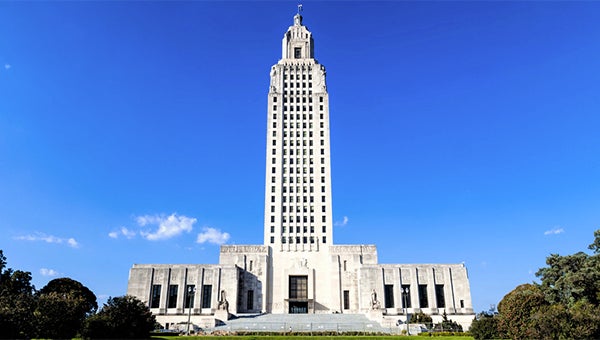U.S. Senate candidates debate: Duke’s presence attracts protests, national media
Published 5:25 am Friday, November 4, 2016

- DAILY NEWS PHOTO/Jesse Wright Protestors at Dillard University in New Orleans hold up signs at Wednesday’s debate for U.S. Senate.
NEW ORLEANS — Six of the top candidates for Louisiana’s open U.S. Senate seat met Wednesday evening for the final debate before the Nov. 8 general election.
The seat was vacated after Republican U.S. Sen. David Vitter had an unsuccessful campaign for governor, and announced he would not seek re-election to his Senate seat.
In polls leading up to the debate, Republican State Treasurer John Kennedy and Democrat Public Service Commissioner Foster Campbell were the top candidates, earning 22 percent and 18 percent, respectively. Popularity aside, no candidate came as close to dominating the night as Republican David Duke, of Mandeville.
Although polling at about 5 percent, Duke, a former Ku Klux Klan leader, repeatedly yelled at moderator John Snell, whom he called a “hack,” and drew repeated criticism from the other candidates.
Snell again and again expressed hope that the debate would not focus on a single candidate. For their part, the other candidates tried to stay on familiar political ground — expressing views on the Affordable Care Act, Social Security and other typical issues. But whenever he got a chance, Duke seized the spotlight and railed against immigrants, the media, foreign wars and Jews, whom he said were a “strong tribal group that dominates our media.” Although, he added, “I’m not opposed to all Jews.”
The debate was held at the historically African-American Dillard University in New Orleans. That location, coupled with Duke’s presence, drew about 80 or so protesters and national media. The protesters were angry no students were allowed to attend the debate, but few citizens of any kind were allowed inside the debate area.
Most of the media representatives — aside from the television cameras broadcasting the event — watched the debate on television in a nearby classroom. No students were allowed inside the building at all. The arrangement had nothing to do with Duke but came at the behest of Raycom Media, who had arranged the debate setup weeks before anyone knew the lineup of the candidates.
Yet even outside the locked down debate hall, the protestors beat on doors and chanted loudly, at times drowning out the televised debate. Midway through the hour-long event, protesters found a way into the building before police restored order with pepper spray. At least two students were arrested but they were soon released back into the crowd.
Duke aside, frontrunner Kennedy took the most heat from his GOP rivals.
U.S. Rep. John Fleming several times jabbed at Kennedy.
“You know what, Mr. Kennedy? If you were my chief financial officer you’d have been fired long, long ago,” Fleming said, early in the debate. Fleming pointed out that the state suffered two recent budget deficits while he was treasurer.
“You’re not ready for prime time,” Fleming said. “You need to go back and learn a little bit more.”
Kennedy shot back that Fleming was lying.
“John is the ultimate Washington insider,” he said. “And Washington insiders quite often don’t tell the American people the truth. And everything he said is a lie.”
He then called Duke a liar and a convicted felon, who took taxpayer money to pay for a gambling addiction.
“It must be terrible to wake up each morning with that much hate in your heart,” Kennedy told Duke.
At this point, Snell allowed Duke a chance to respond. Duke began by saying he was convicted, but that was because he was targeted by the federal government due to his views. Snell tried to interrupt him to point out that Duke had pleaded guilty, but Duke yelled at the moderator.
“You’re not a moderator, you’re a typical media hack,” he said. “Are you gonna silence me? Are you going to keep me from answering this question? I have a right to respond and then you interrupt me.”
On the Democratic Party candidates’ side, Campbell pushed back against opponent Caroline Fayard’s assertions in recent TV ads that he has any relationship with Duke.
“It’s a damn lie,” he said. “It’s not just a lie, it’s a damn lie. I have nothing in common with David Duke except that we’re both breathing … She is doing anything she can to win.”
But Fayard stuck by her ad, which critics argue takes a Campbell quote out of context so it appears he admits to similarities with Duke.
“Foster may not like it, but it’s because he cannot explain it. But frankly neither can I,” she said.
U.S. Rep. Charles Boustany kept a low profile, sticking to policies he has campaigned on for months. He managed to avoid any dust-ups with other candidates, but he also arguably avoided a chance to distinguish himself from the other GOP candidates.
As the hour drew to a close, Snell on three occasions underestimated the amount of time left in the debate and was forced to ask additional impromptu questions, including which presidential candidates the Senate hopefuls supported.
Not surprisingly, all the Republicans supported Donald Trump and the Democrats all supported Hillary Clinton.
After the debate ended, the candidates had the opportunity to chat with media. Most did, although a minute or so into the one-one-one interviews, Duke entered the room and yelled over everyone else that the debate was rigged against him. A Raycom Media employee and campaign staff for other candidates asked Duke to quiet down so other candidates could have individual interviews, but Duke declined and continued yelling for a few minutes more.
At the end of his outburst, he asked for questions. There were none.




